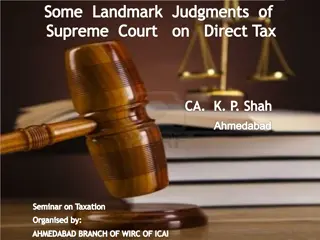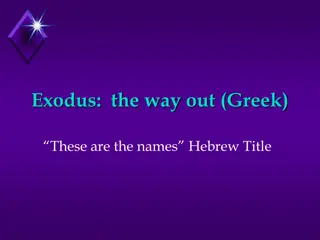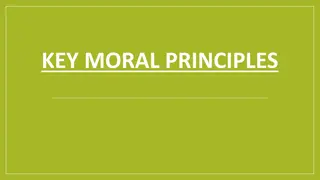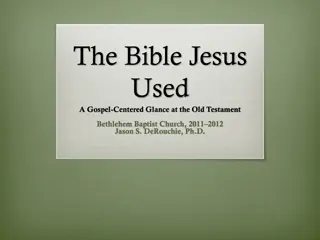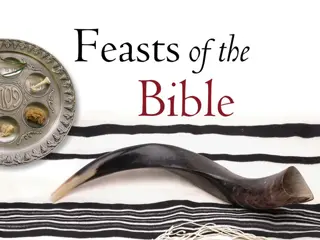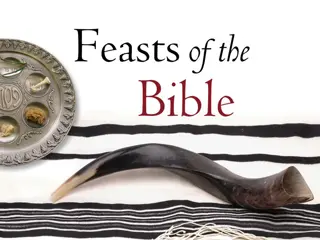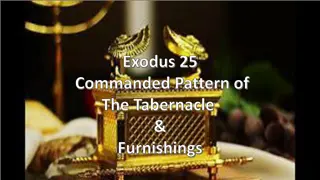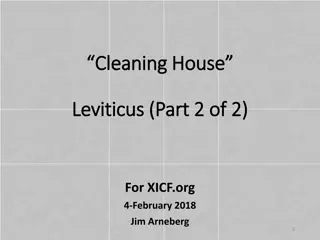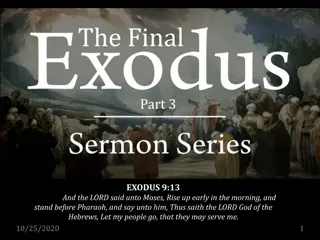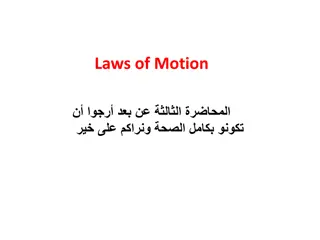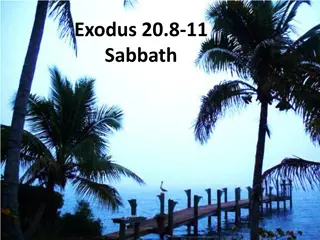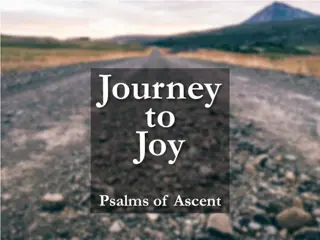Laws and Judgments in Exodus and Leviticus
This text outlines various laws and judgments from Exodus and Leviticus, covering topics such as the treatment of servants, consequences for murder, rules for maidservants, and detailed laws on various offenses. The laws include provisions for freedom after six years of service, the treatment of maidservants, punishments for murder, and guidelines for different scenarios involving slaves, masters, and individuals. These laws provide a foundation for social order and justice in ancient times.
Download Presentation

Please find below an Image/Link to download the presentation.
The content on the website is provided AS IS for your information and personal use only. It may not be sold, licensed, or shared on other websites without obtaining consent from the author.If you encounter any issues during the download, it is possible that the publisher has removed the file from their server.
You are allowed to download the files provided on this website for personal or commercial use, subject to the condition that they are used lawfully. All files are the property of their respective owners.
The content on the website is provided AS IS for your information and personal use only. It may not be sold, licensed, or shared on other websites without obtaining consent from the author.
E N D
Presentation Transcript
Now these are the judgments which thou shalt set before them. Exodus 21
Laws regarding servants (slaves) After six years, he is free! Leviticus 25: 39 41 *** If only he, he goes alone If married, the wife goes with him. If the wife was from master and wife bore him children, man goes alone. If man desires to stay with master and wife and children, his ear is pierced with an aul and he serves forever.
Law regarding maidservants: If a man sells his daughter to be a maidservant, she is NOT to be treated as menservants. If she does not please her master to whom she is betrothed, she is to be redeemed, even by a foreigner. If the master betrothed her to his son, the master must treat her as a daughter. If the master takes another wife, he shall still honor this woman. If these conditions are NOT met, then she is free.
Law regarding murder (see Ex. 20:13) If a man strikes another that he die, the living shall be put to death. If by accident see Numbers 35: 9 - 21 If killed because of sheer hatred, the murderer shall be taken form God s altar and put to death. Killing a parent was to be punished with death!
Sundry laws of detail: Stealing a man to sell as a slave punished by death! Cursing parents punished by death! Striking a man causing injury but not death if he lives, striker must pay for loss of time and heal him thoroughly. If a man strikes his servant or maid that they die, he is to be punished; but if the victim lingers, he shall NOT be punished because the slaves were his property.
Sundry laws of detail: If men strive and hurt a woman with child that she miscarries, yet she if lives, he shall be punished according to the husband s desires; the perpetrator shall pay as the judges determine! If the woman dies, punishment is life for life Eye for eye, tooth for tooth, hand for hand, foot for foot, burning for burning, wound for wound, stripe for stripe. If a master puts out his slave s eye, the slave is free. If a master knocks out his slave s tooth, the slave is free. If an ox gores someone that they die, the ox was stoned, his flesh NOT eaten, but the owner is released from punishment.
Sundry laws of detail: But if the ox had a habit of pushing with its horn, and it was known, and the owner did not keep the ox fenced, if the ox kills, the ox was stoned and its owner also stoned. If it is determined to pay money instead of requiring death, then whatever the judges determined was to be paid. If a servant is killed by the ox, the master was to pay 30 shekels of silver and the ox was stoned. If a man digs a pit and does not cover it, and an animal falls to its death, the owner of the pit pays for the beast, and keeps the beast.
Sundry laws of detail: If a man s ox hurt another man s ox that it dies, then the living ox was sold, they divided the money, and divided the dead beast. But if it was known that the killing ox had a habit of pushing and was not kept fenced, the owner of the killing ox paid ox for ox and the dead ox became the property of the offending owner (i.e., they trade ox for ox.)





